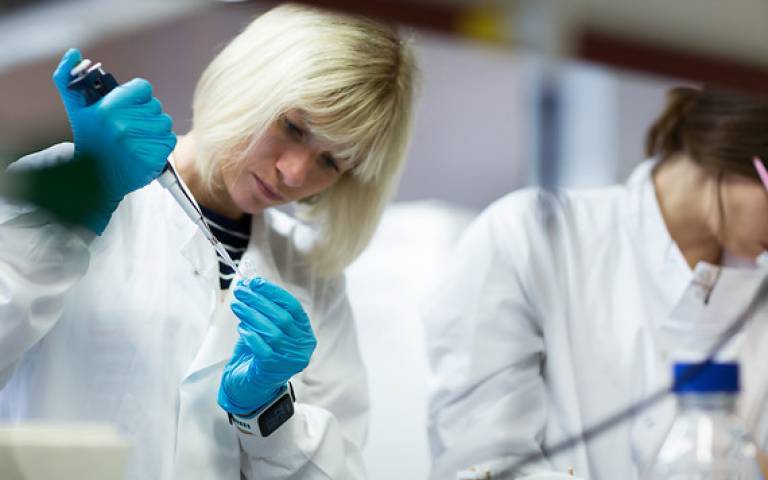UCL scientists awarded a four-year grant to develop novel techniques for future drug discovery
30 June 2021
Roche is supporting the UCL Queen Square Multiple Sclerosis Centre with a large collaborative grant and clinical trial data from more than 900 patients to develop new tools for the prediction and monitoring of treatment response in progressive multiple sclerosis.

UCL Queen Square Institute of Neurology (IoN), the Centre for Medical Image Computing, and a UCL spin-out called Queen Square Analytics have been awarded a multi-year collaborative grant funding by Roche to develop advanced neuroimaging biomarkers and novel AI tools for predicting response to treatments in people with progressive multiple sclerosis.
“Primary progressive multiple sclerosis is an incurable condition with unknown cause. This project will pave the way to develop new imaging tools which will allow us to detect treatment response faster, and with a smaller number of participants, hence expediting drug development for patients with this devastating condition.”, said Professor Frederik Barkhof, who leads the project at the Queen Square Institute of Neurology.
“This project is an example of expedited translation of world-leading research at the UCL Queen Square Institute of Neurology to clinical trials and delivering benefits to patients.” Commented Dr Arman Eshaghi, Senior Research Fellow at the Queen Square MS Centre.
“This significant industry-academic collaboration should not only help us to accelerate future drug development but also bring precision medicine closer to being a reality for people with progressive multiple sclerosis.” commented Dr Declan Chard, co-leader of the project.
Other investigators in the project include Dr James Cole (UCL Department of Computer Science) who, with Dr Eshaghi, will lead AI subprojects, and Dr Ferran Prados (UCL Department of Medical Physics & Biomedical Engineering) who will lead on advanced neuroimaging analysis.
130,000 people in the UK, and more than 2.8 million globally, have multiple sclerosis. It is incurable, but we now have many highly effective treatments that prevent relapses (episodes of symptoms). However, many people with multiple sclerosis eventually develop progressive symptoms, and we only have two treatments for this. This project will address important questions about the treatment of progressive multiple sclerosis.
Roche is a global pioneer in pharmaceuticals and diagnostics focused on advancing science to improve people’s lives. The combined strengths of pharmaceuticals and diagnostics, as well as growing capabilities in the area of data-driven medical insights, help Roche deliver truly personalised healthcare. Roche is working with partners across the healthcare sector to provide the best care for each person.
Links
- UCL Queen Square Institute of Neurology
- Centre for Medical Image Computing
- Professor Frederik Barkhof
- Dr Arman Eshaghi
 Close
Close

